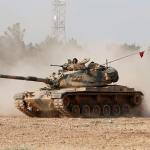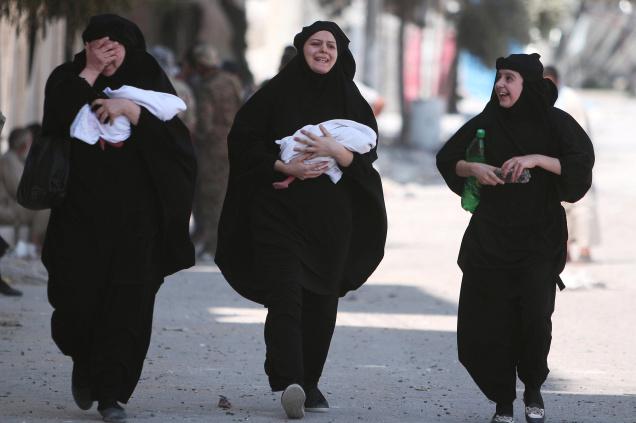Turkey is Now in Syria; What it Means for the Middle East - Two Views
https://portside.org/2016-08-25/turkey-now-syria-what-it-means-middle-east-two-views

Portside Date:
Author: Robert Fisk; Vijay Prashad
Date of source:

- The Predictions Have Come to Pass: Turkey is Now in Syria and This is What it Means for the Middle East - Robert Fisk (The Independent)
- Ankara's Climbdown on Assad - Vijay Prashad (The Hindu)
The Turks don't want a Kurdish mini-state on their frontier any more than the Syrians want to lose territory to the Kurds
By Robert Fisk
August 24, 2016
How the West would love to believe that Turkey's army in Syria - all 10 tanks of it - are striking at last at everyone's enemy, the blood-soaked cult of the "Islamic State". But few in Syria or Turkey will be fooled. Isis have been sitting in Jerablus for many months; it is the advance of the American-armed Kurdish YPG militia along the Turkish border towards Jerablus that worries Sultan Erdogan.
And yet again as Turkish troops advanced, he bundled up the YPG (People's Protection Units) - who the Turks believe have connections with the PKK or Kurdistan Workers Party, whom they view as much more dangerous - as "terrorists", along with Isis. In other words, he's calling both the anti-Assad Isis and the anti-Isis Kurds the enemies of Turkey (as he did after the suicide bombing of a wedding in Gazientep last weekend), lumping his pet hates together. Only his obsession with Fethullah Gulen, whom he blames for July's failed coup, has been omitted from his latest "battle" objectives in Syria.
Erdogan's latest ally, Tsar Vladimir, will have no objections. At one blow, Turkey strikes - however feebly - at both Isis and the pro-American Kurdish militia with whose apparatchiks Moscow has remained studiously aloof. The Syrians will know - and surely will have been told - that Putin supports Turkey's little incursion. They will be in no mood to protest since their own government army was fighting the same Kurdish group in the city of Hassakeh until a ceasefire two days ago. Here, too, the YPG was trying to seize Syrian sovereign territory.
Put simply, the YPG is getting too big for its boots. It is using the anti-Isis war to carve out a little homeland inside Syria along the Turkish border and gobbling up as much of Syria as it can before the civil war ends. The Turks don't want a Kurdish mini-state on their frontier any more than the Syrians want to lose territory to the Kurds. The anti-Assad "Free Syrian Army" is supposed to be among Turkey's little squadron of armour heading for Jerablus but this is likely to be of little interest to Damascus: Syrian troops have long since ceased to regard the FSA as a serious military force and will not worry if its men wish to "martyr" themselves in this Turkish-run operation.
It's all bad news for Isis, of course. And deeply ironic, for it was at the very same Jerablus - under Turkish shellfire today - where TE Lawrence "of Arabia" spent some of the happiest months of his life before the First World War, digging through the ancient ruins of Carcamish, and where he began to frame his affectionate but also deeply racist view of the Arabs. The sterility of the desert, Lawrence would later write of anyone who lived there "robbed him of compassion and perverted his human kindness to the image of the waste in which he hid."
He wrote of the Arab's "delight in pain" and of how the desert became "a spiritual iceberg, in which was preserved intact but unimproved for all ages a vision of the unity of God." Perhaps Lawrence got closer to the mind of Isis than we might imagine. Now the Turks can discover this for themselves in the new ruins of Jerablus.
[Robert Fisk is the multi-award winning Middle East correspondent of The Independent, based in Beirut. He has lived in the Arab world for more than 40 years, covering Lebanon, five Israeli invasions, the Iran-Iraq war, the Soviet invasion of Afghanistan, the Algerian civil war, Saddam Hussein's invasion of Kuwait, the Bosnian and Kosovo wars, the American invasion and occupation of Iraq and the 2011 Arab revolutions. Occasionally describing himself as an `Ottoman correspondent' because of the huge area he covers, Fisk joined The Independent in 1989. He has written best-selling books on the Middle East, including Pity the Nation and The Great War for Civilisation. He was born in Kent in 1946 and gained his BA in English and Classics at Lancaster University. He holds a PhD in politics from Trinity College, Dublin. ]
Turkey warms up to Russia and Iran in a bid to exit before a total rout of its proxies in Syria
By Vijay Prashad
August 24, 2016

Kurdish gains along the Turkish border have been anathema to Mr. Erdogan's government. Women after being evacuated by the Syria Democratic Forces from IS-controlled Manbij in Aleppo, Syria.
Photo credit: Reuters // The Hindu
Sharp changes in the war on Syria have impacted the policy of the Turkish government of President Recep Tayyip Erdogan. Initially Mr. Erdogan believed that the government of Syrian President Bashar al-Assad would fall precipitously. It did not. Rather than overthrow Mr. Assad, the war has placed Turkey itself in danger - a `failed coup' on July 15 came alongside a renewed war against Turkey's Kurdish population, just as Islamic State (IS) attacks in the country have raised alarm bells about Mr. Erdogan's adventurism. An adjustment of Turkey's policy is now on the cards. The President's August 9 trip to Moscow to meet Russian President Vladimir Putin and the warm words exchanged when the Iranian Foreign Minister came to Turkey on August 10 indicate a change.
Failure in Syria
In 2011, Turkey had hastily come out in favour of the removal of Mr. Assad. "It is not heroism to fight against your own people," Mr. Erdogan said in November 2011. This was a curious call from the head of government in a state that had been at war against its own people, namely the Kurds, since the 1980s. The call amplified the chorus in the Gulf Arab and Western capitals. Their main goal was to weaken Iran by overthrowing the Assad government.
Mr. Erdogan hoped that his fraternal Syrian Muslim Brotherhood would ride into Damascus on the wings of Western-driven regime change. But the West was wary. It provided diplomatic and military support to the rebels, but found the road to Damascus blocked by Russia, Iran and China. None of them wanted to see the scenario of Iraq or Libya replayed in Syria. Furthermore, Russia and Iran had material interests in Syria that they did not want to jeopardise. Now, five years later, Mr. Erdogan's forward policy has failed, which is why he has warmed up to both Russia and Iran in a bid to chart out a path from the Syrian quagmire.
Turkey's long border with Syria proved to be the most accessible route for arms and fighters. Gulf Arab and Western intelligence prowled the towns of the borders, working with Turkish intelligence to provide support for the motley crew of proxy armies. It was along this border that the Kurdish fighters, supported by the Kurdistan Workers' Party (PKK), a group banned in Turkey, began to make inroads. Last week, a coalition of the Kurds and Arabs under the flag of the Syria Democratic Forces seized the IS-held town of Manbij. Kurdish gains along the Turkish border have been anathema to Mr. Erdogan's government, which had restarted its war against the Kurdish population inside Turkey as well as against PKK camps in Iraq. It was this war that opened up tensions between Washington and Ankara, with the former uneasy with the Turkish assault on some of the main groups that had been fighting the IS.
It is not yet clear who authorised the `failed coup' against the civilian government in Turkey. Mr. Erdogan blames the movement of his former ally Fethullah Gülen. Since Mr. Gülen lives in the U.S. and because of rumours that the U.S. troops at the Turkish base in Incirlik had helped the coup plotters, animosity against the U.S. rose sharply. In late July, thousands surrounded the Incirlik base, burning U.S. flags and chanting `Death to the U.S.'. This was the day before the head of the U.S. Joint Chiefs of Staff General Joseph Dunford arrived in Turkey to soothe the heated relations. The firmest indicator that the U.S. opposed the coup, said Mr. Erdogan, would be the extradition of Mr. Gülen. Since this is not likely to take place, tensions between the U.S., North Atlantic Treaty Organisation and Turkey will remain.
Russia and Iran outreach
Instability in Turkey as a result of the Syrian war has created great economic problems. The doors to the Western market are not wide open, while the war in Syria has blocked the West Asian marketplace. Renewed ties with Russia have restarted the Turkish Stream gas lines and prompted a Russian reaffirmation of its promise to build nuclear reactors in Turkey. The business lobbies close to Mr. Erdogan can breathe again.
Over the course of the past year, both Turkey's proxy armies in Syria and its Syrian political allies have seen their position weakened. Saudi Arabia's games with the Syrian opposition bloc has snuffed out the dominance of the Syrian Muslim Brotherhood. Meanwhile, under heavy Syrian and Russian bombardment, the extremist rebel fighters of Aleppo, including the Turkish proxies, have faced setbacks. It is clear that the extremists, including the Turkish proxies, will not be able to hold on for too long. Turkey seeks an exit before a full battlefield humiliation.
During his visit to Moscow, Mr. Erdogan suggested that Turkey needed to coordinate Syria policy with Russia and Iran. On August 20, his Prime Minister Binali Yildirim said that Mr. Assad could stay in power for a transitional period. The slogan `Assad must go' is no longer fundamental to Turkish foreign policy.
The day after Mr. Erdogan left Russia, a delegation of senior Turkish military officers arrived to coordinate a military command centre. Turkey is eager that the Kurdish forces not take territory along the border. Russian military officers told them that this would be a priority. A few days later the Iranian and Turkish Foreign Ministers announced close coordination on Syria. This is surely a blow to Turkey's proxies, and indeed to the Gulf Arabs who have come to rely upon Turkey as the pathway into Syria.
Iran's Foreign Minister Mohammad Javad Zarif told the press in Ankara that the "era of bullying and coups is over" and that "people's choice cannot be suppressed by a military group". The statement was about the `failed coup' in Turkey. It could just as well have been with reference to Syria, a country destroyed by regional ambitions. The rebalancing of Turkish foreign entanglements might finally allow Syria's future to be less grim.
[Vijay Prashad, a columnist for the Turkish daily BirGün, is the author of fifteen books, most recently of The Death of the Nation and the Future of the Arab Revolution (LeftWord Books). He is a Professor of International Studies at Trinity College, Hartford, a journalist and commentator. In 2013 - 2014, Prof. Prashad was the Edward Said Chair at the American University of Beirut, Beirut, Lebanon. He earned his B.A. in History at Pomona College, Claremont and both an M.A. and Ph.D. in History at the University of Chicago.]
